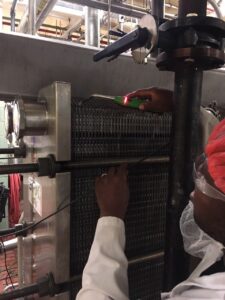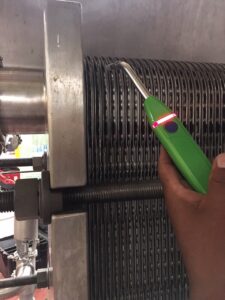7 Benefits of Integrity Testing for Heat Exchangers
In sanitary processing, preventative maintenance can make a huge difference in the efficiency of your process and bottom line. Rodem has partnered with Masterleo- A Rodem Company to provide our customers with high quality integrity testing for their heat exchangers.
Integrity testing is a simple process that uses hydrogen to check for small cracks in your heat exchangers. With four simple steps, Masterleo technicians can determine if your plate heat exchangers are running efficiently. To check the strength of your heat exchangers Masterleo’s technicians: 
- Connect their integrity testing device up to your plate heat exchangers
- Push the hydrogen through your heat exchangers checking for gas that would come through cracks in the heat exchangers.
- Take measurements at 3 different pressure levels.
- Report back on their findings and make recommendations to help you continue to operate safely.
Integrity testing for heat exchangers offers a variety of benefits. Here are seven distinct ways integrity testing can help improve your sanitary process.
1. Increase Processing Efficiency
Integrity testing services ensure your plate heat exchangers operate at peak performance while maintaining the integrity of your end-product. Integrity testing on plate heat exchangers increases overall process efficiency by avoiding unexpected downtime
2. Enhanced Operational Reliability
Integrity testing serves as a proactive measure to identify potential issues before they escalate, minimizing the risk of unexpected failures. This translates to improved operational reliability, reduced downtime, increased overall equipment effectiveness (OEE), and consistent processing results.
3. Safety Assurance and Contamination Prevention
Maintaining the structural and functional integrity of heat exchangers is essential for ensuring a safe working environment and preventing product contamination. Integrity testing helps identify vulnerabilities that may pose safety risks and potential entry points for contamination, allowing timely interventions to prevent these issues, which avoids recalls and product loss.
4. Extended Equipment Lifespan
Regular integrity testing acts as a preventive maintenance tool, helping to identify and mitigate corrosion, erosion, and other potential damage that could compromise the longevity of heat exchangers. By addressing issues early on, you can significantly extend the lifespan of your equipment. We don’t mention the fact that this is predictive maintenance. This might be a good spot to add that and/or mention that it detects flaws on both plates and gaskets alike.
5. Optimized Energy Efficiency
Efficient heat transfer is crucial for energy-intensive processes. Integrity testing ensures that heat exchangers are operating at peak efficiency, facilitating optimal energy transfer and reducing energy consumption. This not only benefits the environment but also contributes to cost savings.
6. Compliance with Industry Standards
Adhering to industry standards and regulations is non-negotiable. Integrity testing provides a systematic approach to meet compliance requirements, ensuring that your heat exchangers align with the latest industry standards and guidelines.
7. Customized Maintenance Strategies
Integrity testing results provide valuable insights into the specific condition of heat exchangers. This data empowers maintenance teams to tailor their strategies, focusing resources where they are most needed and optimizing the overall maintenance program.

Embracing integrity testing as a core component of your maintenance routine not only safeguards your assets but also bolsters the efficiency and longevity of your heat exchangers. Ensuring the integrity of heat exchangers is crucial for optimal performance, efficiency, and safety.
Contact a Rodem representative today to schedule integrity testing for your heat exchangers.


